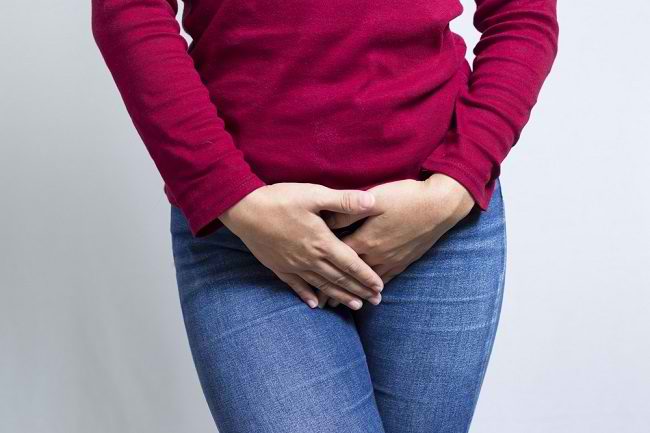Many things make some women feel uncomfortable during menstruation. Complaints such as itching, burning and foul-smelling vaginal discharge have become problems that are often experienced by women. It could be that these complaints arise because vaginal hygiene during menstruation is not maintained.
A healthy vagina is ideally odorless, does not itch, and is not reddish in color at the vulva. In fact, the vagina tends to become more moist during menstruation. The closed feminine area is prone to make the vagina moist and makes bacteria and fungi multiply easily. As a result, women will more easily experience vaginal itching and discharge. In addition to these two complaints, uncontrolled yeast growth in the vagina can also cause redness, pain when urinating or having sex, rash, itching, and vaginal swelling.

Causes of itchy vaginal discharge and vaginal discharge
Although it happens quite often, vaginal itching and vaginal discharge during menstruation should not be underestimated. This is because the moist vaginal conditions during menstruation allow yeast to grow uncontrollably, especially during menstruation. Especially if you do not maintain regular vaginal hygiene. Here are some causes of vaginal itching and discharge:
- Rarely changing sanitary napkins or pantylinerDo not change pads or pantyliner routinely can be the cause of the emergence of complaints in the vagina. Using the same pads or pantyliner for too long makes the vagina more moist. This moist vaginal condition is an ideal place for yeast to multiply.
- Changes in vaginal pHIf complaints such as itching appear before the menstrual cycle begins, most likely the cause is a change in the pH level in the vagina. Before you menstruate, the hormone estrogen will decrease drastically. This is what makes the balance of good bacteria in the vagina disrupted and causes vaginal itching.
- Using panties that are too tightWearing underwear that is too tight and made of synthetic materials can also cause the female organs to become damp. This is because the underwear can block air circulation around the vagina, thus making it easy to moisten. This excess moisture ultimately triggers the growth of yeast in the vagina.
9 Tips to Maintain Vaginal Hygiene
The vagina is a female organ that can clean itself. However, that does not mean that you are negligent in maintaining cleanliness. Here's how to prevent the appearance of complaints in the vagina, such as:
- Clean the vagina regularlyCleaning the vagina is very important to be done regularly and correctly, especially when you are entering the menstrual cycle. Clean your vagina every time you finish urinating and defecating. Make sure you clean the vagina from front to back (from the vagina to the anus), not the other way around. This is to avoid the transfer of bacteria from the anus to the vagina. Every now and then, you can also use clean, unscented wipes to dry your vagina.
- Using feminine hygiene wiselyYou can also use feminine soap to clean the vagina. However, avoid using feminine soaps that contain fragrance or perfume. Because, the use of soap with fragrance will only irritate the skin around the vagina. In addition, avoid using vaginal douching because it can disrupt the pH balance of the vagina, so that the growth of good bacteria in the vagina is disrupted. You just use water to clean it.
- Use underwear that absorbs sweatAlways use cotton underwear that easily absorbs sweat and is not too tight. The use of underwear like this, can help keep the vagina dry so it doesn't get too damp and itchy.
- Eat healthy foodPay attention to the food you eat, because a healthy diet will help maintain vaginal health. Foods that are considered good for the health of the female area include yogurt, fish, berries, and foods containing soy.
- Wash hands before and after changing sanitary napkins or pantylinerThis simple activity is often forgotten by women. In fact, washing hands is useful to prevent the transfer of bacteria that may be on the hands to the vagina, thereby minimizing the occurrence of infection. Make sure to always wash your hands before and after changing sanitary napkins or pantyliner for a healthier vagina.
- Change pads or pantyliner every 3-4 hoursMake sure you know when is the right time to change your sanitary napkin or pantyliner. Because during menstruation, blood and fluids around the vagina can be a medium for the growth of microorganisms that cause infection and irritation. Pads that are not replaced can cause odor and infection caused by menstrual blood. Therefore, it is recommended to change pads at least every 3-4 hours, even if the blood volume is not too much.
- Choose sanitary napkins that absorb wellUse sanitary napkins that have good absorbency. The use of pads with good absorbency allows the vagina to remain dry, so it is protected from the growth of bacteria and fungi, and prevents the appearance of unpleasant odors during menstruation. So, find a pad that fits your needs.
- Choose unscented sanitary napkinsIt is recommended to choose pads that do not contain fragrance or perfume, especially if you have sensitive skin. Adding perfume to the pads will only make the skin of the feminine area prone to itching and vaginal discharge. It is recommended to choose a sanitary napkin product that is labeled hypoallergenic, because this type of product is considered safer for owners of sensitive skin.
- Pads with natural antibacterialTo get extra protection, you can use sanitary napkins that contain natural ingredients, one of which is betel leaf. Betel leaf has long been known to have antiseptic properties. No wonder the content contained in betel leaf is often used to prevent infection and irritation of wounds. However, clinical evidence regarding the effectiveness of betel leaf in preventing irritation and infection still needs further research.
Consult a doctor if you experience signs of infection or irritation of the vagina that can occur due to lack of maintaining the cleanliness of the female organs. Therefore, do not be lazy to always maintain the cleanliness of the female organs on a regular basis, especially during menstruation.









